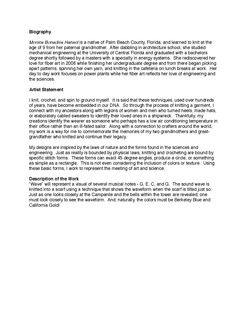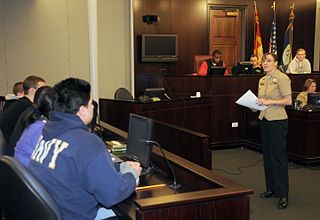 W
WAn artist's statement is an artist's written description of their work. The brief text is for, and in support of, their own work to give the viewer understanding. As such it aims to inform, connect with an art context, and present the basis for the work; it is, therefore, didactic, descriptive, or reflective in nature.
 W
WIn mathematics, a conjecture is a conclusion or a proposition which is suspected to be true due to preliminary supporting evidence, but for which no proof or disproof has yet been found. Some conjectures, such as the Riemann hypothesis or Fermat's Last Theorem, have shaped much of mathematical history as new areas of mathematics are developed in order to prove them.
 W
WAn elevator pitch, elevator speech, or elevator statement is a short description of an idea, product, or company that explains the concept in a way such that any listener can understand it in a short period of time. This description typically explains who the thing is for, what it does, why it is needed, and how it will get done. Finally, when explaining an individual person, the description generally explains one's skills and goals, and why they would be a productive and beneficial person to have on a team or within a company or project. An elevator pitch does not have to include all of these components, but it usually does at least explain what the idea, product, company, or person is and their value.
 W
WA fact is an occurrence in the real world. The usual test for a statement of fact is verifiability—that is whether it can be demonstrated to correspond to experience. Standard reference works are often used to check facts. Scientific facts are verified by repeatable careful observation or measurement by experiments or other means.
 W
WI Am a Man is a declaration of civil rights, often used as a personal statement and as a declaration of independence against oppression.
 W
WA Leave and Earnings Statement, generally referred to as an LES, is a document given on a monthly basis to members of the United States military which documents their pay and leave status on a monthly basis.
 W
WIn argumentation, an objection is a reason arguing against a premise, argument, or conclusion. Definitions of objection vary in whether an objection is always an argument or may include other moves such as questioning.
 W
WAn opening statement is generally the first occasion that the trier of fact has to hear from a lawyer in a trial, aside possibly from questioning during voir dire. The opening statement is generally constructed to serve as a "road map" for the fact-finder. This is especially essential, in many jury trials, since jurors know nothing at all about the case before the trial,. Though such statements may be dramatic and vivid, they must be limited to the evidence reasonably expected to be presented during the trial. Attorneys generally conclude opening statements with a reminder that at the conclusion of evidence, the attorney will return to ask the fact-finder to find in his or her client's favor.
 W
WIn mathematics and logic, a theorem is a non-self-evident statement that has been proven to be true, either on the basis of generally accepted statements such as axioms or on the basis of previously established statements such as other theorems. A theorem is hence a logical consequence of the axioms, with a proof of the theorem being a logical argument which establishes its truth through the inference rules of a deductive system. As a result, the proof of a theorem is often interpreted as justification of the truth of the theorem statement. In light of the requirement that theorems be proved, the concept of a theorem is fundamentally deductive, in contrast to the notion of a scientific law, which is experimental.
 W
WA vision statement is an inspirational statement of an idealistic emotional future of a company or group. Vision describes the basic human emotion that a founder intends to be experienced by the people the organization interacts with, it grounds the group so it can actualize some existential impact on the world.